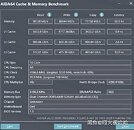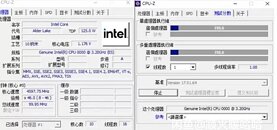TheLostSwede
News Editor
- Joined
- Nov 11, 2004
- Messages
- 18,855 (2.50/day)
- Location
- Sweden
| System Name | Overlord Mk MLI |
|---|---|
| Processor | AMD Ryzen 7 7800X3D |
| Motherboard | Gigabyte X670E Aorus Master |
| Cooling | Noctua NH-D15 SE with offsets |
| Memory | 32GB Team T-Create Expert DDR5 6000 MHz @ CL30-34-34-68 |
| Video Card(s) | Gainward GeForce RTX 4080 Phantom GS |
| Storage | 1TB Solidigm P44 Pro, 2 TB Corsair MP600 Pro, 2TB Kingston KC3000 |
| Display(s) | Acer XV272K LVbmiipruzx 4K@160Hz |
| Case | Fractal Design Torrent Compact |
| Audio Device(s) | Corsair Virtuoso SE |
| Power Supply | be quiet! Pure Power 12 M 850 W |
| Mouse | Logitech G502 Lightspeed |
| Keyboard | Corsair K70 Max |
| Software | Windows 10 Pro |
| Benchmark Scores | https://valid.x86.fr/yfsd9w |
The first indication of what to expect in terms of early DDR5 memory performance on Intel's Alder Lake platform has leaked, courtesy of a Chinese forum and Twitter. It's not the first time we've seen DDR5 performance figures, but this time the CPU is clocked at much higher speeds compared to the figures leaked by Longsys back in March.
Although the memory is still running at 6400 MHz, performance is up significantly with read speeds of over 90 GB/s. As we're most likely still looking at an ES sample and an early UEFI build, there should be room for improvement here. The leaked performance numbers appear to be from a Dell system of unknown model.


The not so great news is that the memory latency is still very high at 92.5 ns, although the 40-40-40-85 timings of the DDR5 modules used most likely has something to do with this. The CPU used for the test is said to be a Core i5 12600K and as an extra bonus, single core CPU-Z numbers of it were also posted, where it scores 785.6 points.
At this point in time, DDR5 still doesn't look very exciting, but as always when we transition to new memory technologies, there is usually an overlap where the fastest memory of the older generation always tends to outperform the first couple of JEDEC rated speeds of the new generation of memory. Once the memory module manufacturers get to play around a bit with DDR5, we expect to see much better performing modules in the market.
View at TechPowerUp Main Site
Although the memory is still running at 6400 MHz, performance is up significantly with read speeds of over 90 GB/s. As we're most likely still looking at an ES sample and an early UEFI build, there should be room for improvement here. The leaked performance numbers appear to be from a Dell system of unknown model.


The not so great news is that the memory latency is still very high at 92.5 ns, although the 40-40-40-85 timings of the DDR5 modules used most likely has something to do with this. The CPU used for the test is said to be a Core i5 12600K and as an extra bonus, single core CPU-Z numbers of it were also posted, where it scores 785.6 points.
At this point in time, DDR5 still doesn't look very exciting, but as always when we transition to new memory technologies, there is usually an overlap where the fastest memory of the older generation always tends to outperform the first couple of JEDEC rated speeds of the new generation of memory. Once the memory module manufacturers get to play around a bit with DDR5, we expect to see much better performing modules in the market.
View at TechPowerUp Main Site



